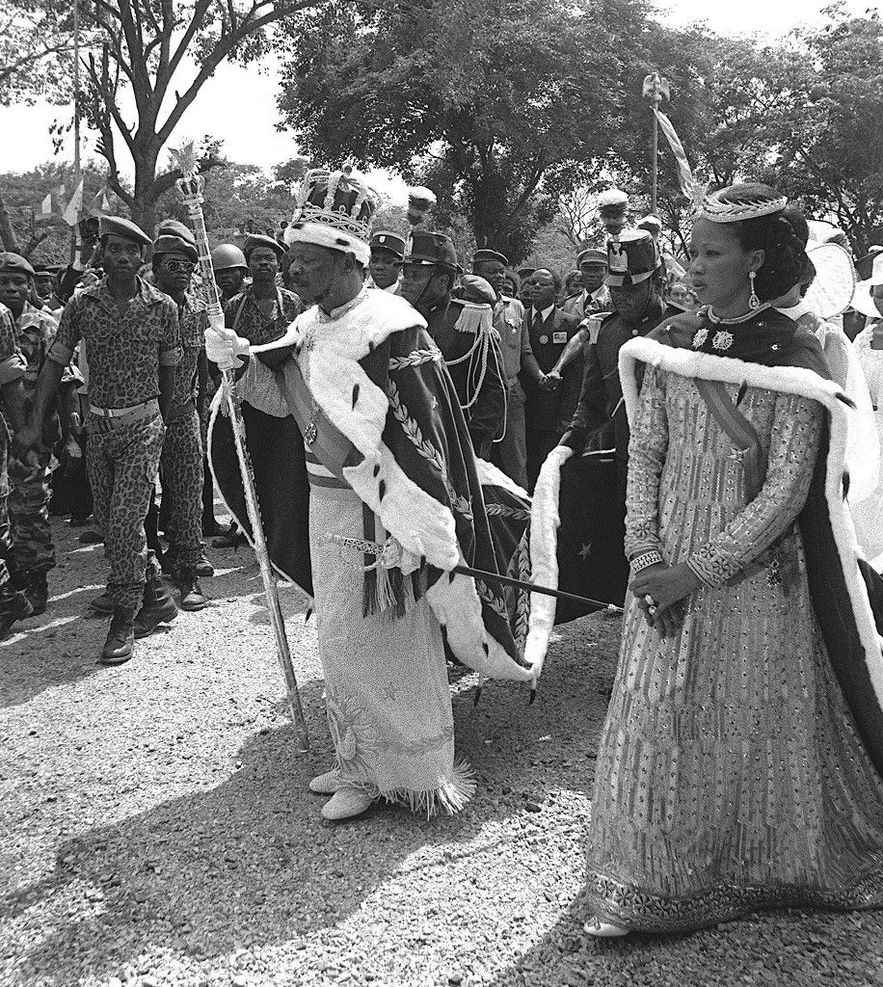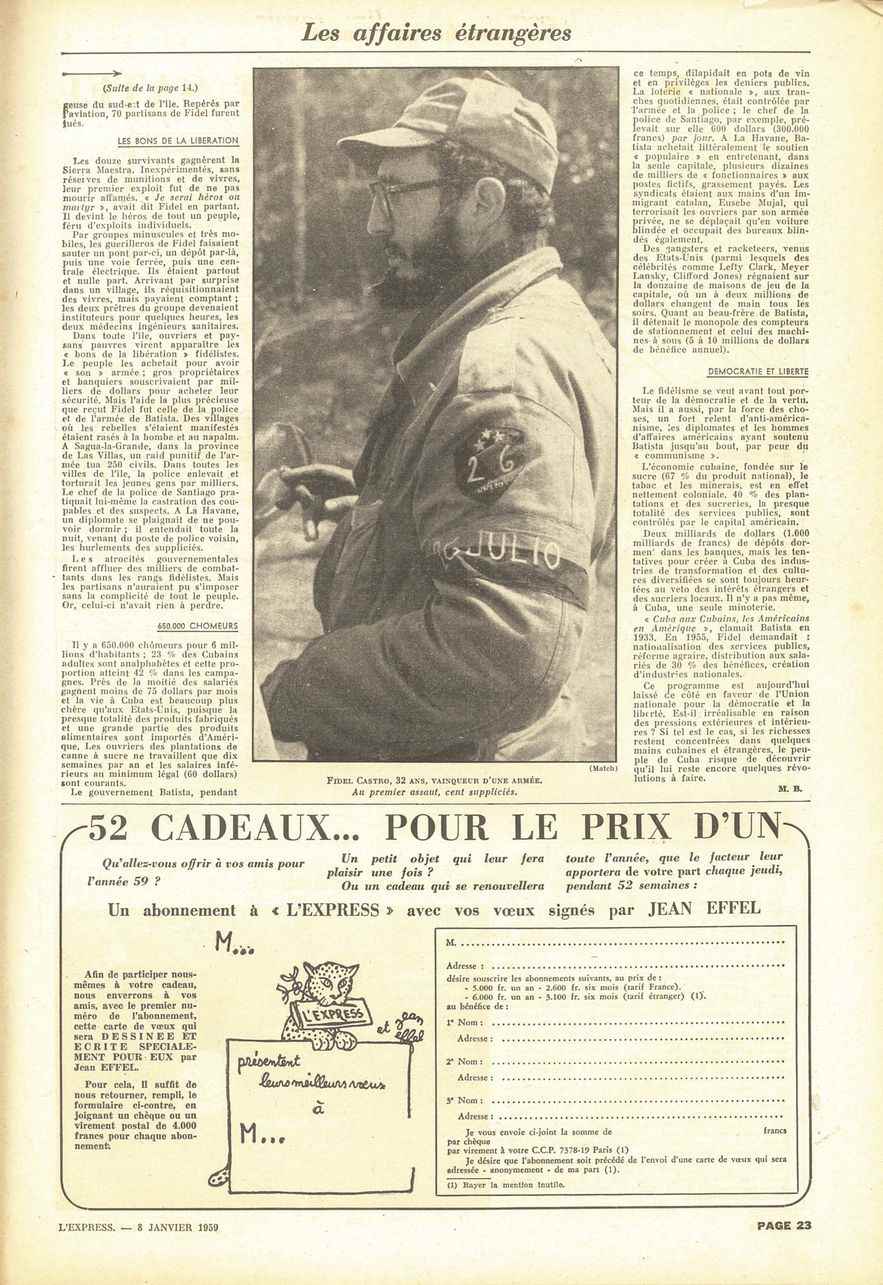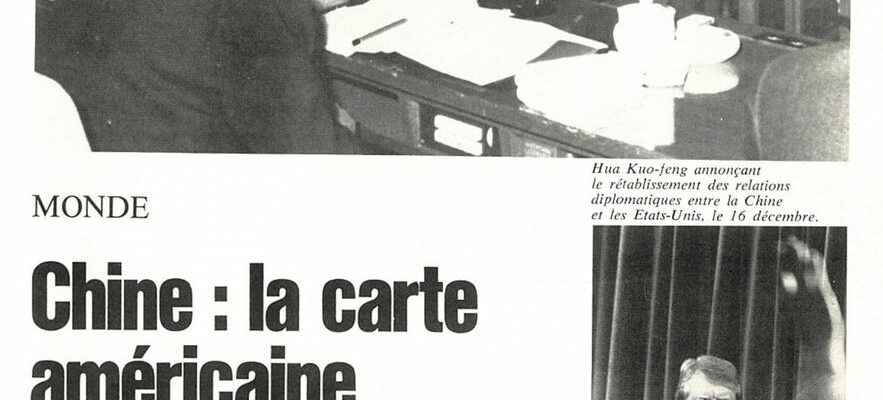Since its creation on May 16, 1953, L’Express has covered the highlights of national and international news every week. Opening the archives of our newspaper means traveling through 70 years of contemporary history between decolonization, the Cold War, the Great Leap Forward… Through our archives, we invite you to rediscover the recognition of Beijing by Washington in 1979, the seizure of power by Jean-Bedel Bokassa in the Central African Republic in 1966, the independence of Cameroon in 1960 and the end of General Batista’s regime in Cuba in 1959. All these events came to shake up the news on the first day of the year.
January 1, 1979 – The United States recognizes the People’s Republic of China
“The United States recognizes the Beijing regime a quarter of a century after Great Britain and the Scandinavian countries (1954) and fifteen years after France (1964). The decision was part of the role that the United States plays in Asia, in the evolution of post-Maoist China.Yet it is surprising by the timing, the kind of haste that took hold of Jimmy Carter, the political cynicism that consists in confronting the nationalists of Taiwan (Formosa) with the fact accomplished.
Since mid-September, President Carter has been accelerating negotiations for the re-establishment of diplomatic relations with the People’s Republic of China. His impatience kept growing. […] It remains to be asked for what reasons Carter wanted to obtain the agreement of the Chinese at the latest on January 1, 1979 and the Chinese showed themselves ready to grant it to him. If dates have any meaning, Carter dreamed of a double or even a triple hit. He hoped to announce at about the same time the conclusion of the Israeli-Egyptian peace and the “coup of Beijing”. His position with regard to Congress and public opinion would have been consolidated to the point that he could have considered, with peace of mind, his re-election at the end of 1980.
On the other hand, he would have held in his hands the assets necessary for the successful conclusion of negotiations with Moscow for the signing of the new agreement on the limitation of strategic arms (Salt 2). The agreement between Anouar El-Sadat and Menachem Begin did not materialize, and relations with Beijing suddenly took on another dimension. The progress made with the Chinese compensated for the failure suffered in Cairo and Jerusalem.” (L’Express, December 23, 1978)
Article on Sino-American relations in L’Express of December 23, 1978
© / The Express
January 1, 1966 – Bokassa’s coup in the Central African Republic
“In seizing power in Bangui, capital of the Central African Republic, Colonel Bokassa, a former French soldier who became a captain after twenty years of service, took a series of quite significant measures. First, he spent a decree “abolishing the bourgeoisie”, which, in this country of peasants, does not exist outside the class of civil servants. Then, it prohibited “playing the tam-tam from sunrise to sunset” , except on Saturdays and public holidays. Finally, he asked ministers and civil servants not to go to the cinema during working hours. Interesting measures, but not necessarily requiring a coup d’etat.
In fact, if the colonel saw fit to hurl these slogans at the crowd, which will be greatly appreciated, he above all thought of concealing in this way the real reason for his putsch. It was a question of stopping a political evolution considered dangerous since President Dacko had, to follow the example of France, recognized the People’s Republic of China. The representatives of several Western powers in Bangui, who are very bored in this capital of 85,000 inhabitants, did not fail to attach great importance, in their relations, to the close contacts that the Ambassador of the People’s Republic of China, Mr. Meng Yeng, had established with men like the general secretary of the single party, Mr. Charles Ondorna.” (L’Express of January 10, 1966)

Self-proclaimed emperor Jean-Bedel Bokassa and his wife Catherine review the troops during his coronation on December 4, 1977 in Bangui, just over 10 years after his coup.
© / AFP
January 1, 1960 – Cameroon celebrates its independence
“Illuminated and deserted streets. Heavy and moist heat. Faces closed. Blood in Yaoundé. Blood in Douala. Fear. This feeling of unease among personalities from all over the world. leaves to get his gun at nightfall.The first hours of Cameroonian independence, which coincided with the night of New Year’s Eve, hardly made the peals of popular jubilation resound. […]
The January 1 sun lit up a transformed city. In the streets of Yaoundé, which stretch between the hills like the legs of a giant spider, appeared, in joyful processions, women with shimmering loincloths. Very early in the morning, Mr. Bénard, France’s first ambassador to Cameroon, presented his credentials to Mr. Ahidjo. From everywhere, in a deafening din of horns, the official cars appeared. Everyone went near the stadium, where the President of the Cameroonian Council was to proclaim the independence of his country and make a first speech as the head of a sovereign state. Very vile, emotion seized the audience, especially the French. It must be admitted: everyone had feared the worst. The crowd was there, massed on the place of independence, Everywhere a debauchery of green, red, yellow. Applause, cries.” (L’Express of January 7, 1960)
Jan. 1, 1959 – Castro Takes Down Batista in Cuba

Article from January 8, 1959 on the coming to power of Fidel Castro in Cuba
© / The Express
“Last Thursday, January 1, before dawn, President Fulgencio Batista summoned his ministers and his closest friends. The revolutionary general strike had just been called throughout Cuba. For four days, the city of Santa Clara, railway junction which controls the communications of all the island, was the scene of a battle of streets of an extraordinary ferocity. The government aviation sprayed with bombs and grapeshot the localities in the hands of the rebels. Disgusted by the butchery, forces of order deserted and went over to the insurgents. Fulgencio Batista had lost his bet. He had been brought to power, in spite of himself, twenty-five years ago, when he was a stenographer sergeant in the army. He wore then a leather jacket, a dagger and a gun in his belt; in the eyes of the Cuban people, he embodied the victory of the poor against the powerful and the rich.
The audacious, modest and tolerant tribune of twenty-five years ago had become, since 1952, the date of his return to power following a military putsch, one of the bloodiest dictators in contemporary history. . […] On January 1 before dawn, followed by 400 of his followers, he flew to Santo Domingo, taking with him 300 million dollars (150 billion francs), of which a hundred came from the looting of the Security coffers. social. […]
It was in the east of the island, however, that the insurgents celebrated their real victory. Despising corrupt Havana, they set up their capital and provisional president in Santiago, to begin their long triumphal march across the island, led by their leader, Fidel Castro. Who were these insurgents, and who was their leader? “Crazy people”, they said, six months ago. Haunted by the ideals and the language of the French Revolution (provisional President Urrutia calls his ministers “citizen”), they have no defined program or ideology. Everything can be summed up in two words: Freedom, Democracy. Twelve years ago, Fidel Castro, then aged 19, enlisted in the “American Legion” to free Santo Domingo from the dictatorship of “Generalissimo” Trujillo. The “generalissimo” had him arrested by the Cuban police. Fidel pondered the lesson. Son of a Spanish immigrant who had made his fortune planting sugar cane, Fidel, trained by the Jesuits, led a resistance group at the University of Santiago where he was studying law.” (L’Express of January 8, 1959)
